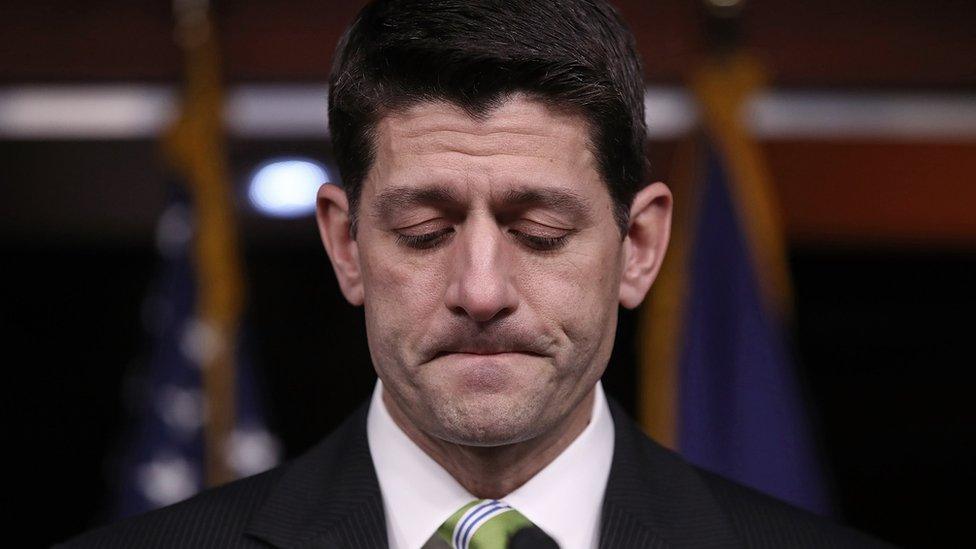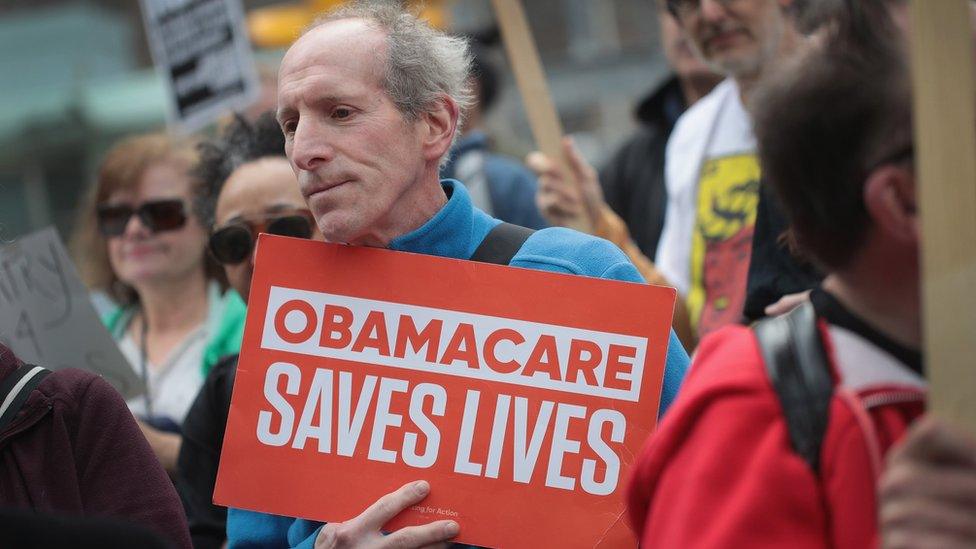Donald Trump: Tax reform next after healthcare failure
- Published
Trump's battles with Obamacare - in his own words
US President Donald Trump says he will turn to tax reform, following his failure to get his healthcare bill through Congress on Friday.
The draft bill would have scrapped the Affordable Care Act of his predecessor Barack Obama, which was opposed by Mr Trump's Republican party for years.
Obamacare requires all Americans to have health insurance but offers subsidies to people on low incomes.
Mr Trump's bill was withdrawn because of a lack of support from Republicans.
They control both houses of Congress, and the withdrawal is a major setback for the new president.
Mr Trump campaigned on his skills as a dealmaker.
"I would say that we will probably start going very, very strong for the big tax cuts and tax reform. That will be next," Mr Trump told reporters at the White House.
However, the tax cuts were supposed to be paid for by savings from the withdrawn healthcare bill.
Without the spending cuts in the failed bill, any tax cuts will add to the federal budget deficit.

The failure is also a setback for Speaker Paul Ryan
Mr Trump lashed out at Democrats in Congress after the bill was withdrawn, blaming the opposition party for not backing his legislation.
But it was House Republicans who ensured it was shelved, after Speaker Paul Ryan decided he could not get enough backing from his own party.
"Doing big things is hard," Mr Ryan said.
The president refrained from criticising Mr Ryan, whose job as speaker of the House involves rallying support for controversial bills.
"We learned about loyalty; we learned a lot about the vote-getting process," he said.
On Saturday Mr Trump repeated his claim that Obamacare would "explode", tweeting, external "we will all get together and piece together a great healthcare plan for THE PEOPLE. Do not worry!"
Obamacare has been troubled by increases in insurance premiums. It also imposes tax penalties on uninsured Americans - many of them low- to moderate-income earners.
However, it also bans insurance companies from denying health coverage to people with pre-existing health conditions and allows young people to remain on their parents' plans until age 26.
Treasury Secretary Steve Mnuchin said on Friday that tax reform was "a lot simpler" in many ways than healthcare reform.
Mr Mnuchin said that his goal remained to get tax measures through Congress by August this year.
White House press secretary Sean Spicer admitted that this goal was "an ambitious one", but one that the administration was "going to try to stick to".

What did the healthcare bill propose?

Demonstrators in Chicago celebrated the failure of the Republican reforms
Cutting the Medicaid programme for low earners
Providing tax credits to help people pay medical bills, but reduced compared to Obamacare
Ending penalties on those who do not buy health coverage
Allowing insurers to raise premiums for older people
Blocking federal payments to women's healthcare provider Planned Parenthood for a year
Insurers would no longer have been required to include "essential benefits", such as maternity care, mental health and emergency treatment